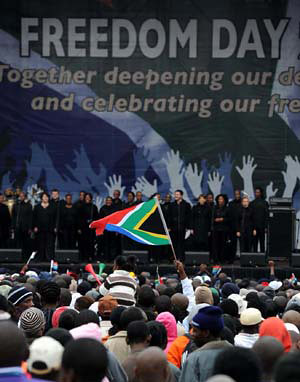
Freedom Day 16th anniversary rally at the Union Bldg. in Pretoria, South Africa. President Zuma said in his address that there was much to be done for the country., a photo by Pan-African News Wire File Photos on Flickr.
ANC's election victory was a landslide: iLIVE
May 29, 2011 3:08 AM|
By Sandile Zungu, by e-mail
President Zuma led the ANC to an outstanding performance in the recent local government elections.
This is a reality that even Zuma's most begrudging political adversaries should not fail to admit. At 62% of the popular vote, the (three percentage point) drop in the ANC's share of the electorate since the previous elections is paltry.
The performance of the ANC should be seen in the context of the emergence, since the last elections, of a splinter party, COPE. Splinter and breakaway parties tend to reserve their most lethal venom for their erstwhile organisations, and it is not inconceivable that COPE would have sought to demolish the Zuma-led ANC. Despite their best efforts, the fastidious electorate gave them only 2%. Most importantly, the resilience of the ANC should be juxtaposed with the demolition of Dr Buthelezi's IFP, whose breakaway party, the National Freedom Party, took nearly 40% of its electoral support base.
It is against this background that attempts by some writers and analysts to pour cold water on the overall performance of the ANC are strange indeed. Clutching at the decline of three percentage points and to trying to stir the pot with false headlines such as "ANC is left shaken" (May 22), was mischievous. Attempts aimed at inciting the membership of the ANC to bay for the blood of their senior leadership risk being seen for what they are - cheap, desperate and futile. Sunday Times, what's cooking? Rather, what are you cooking up? Frankly, the headline, "Landslide!" would have been more appropriate.
However exuberant the ANC may be, it should still recognise that it suffered setbacks in key voting districts. It was decimated in the Cape Town metro and its performance in the Nelson Mandela Bay metro was entirely sub-optimal.
Undoubtedly, many factors caused the ANC to fare poorly in Nelson Mandela Bay. Fundamentally, one would argue that the birth of COPE was unfortunate in the short to medium term for the share of influence of the Eastern Cape within the ANC. This collective state of loss of influence incubated the secondary factors, such as the alleged misdemeanours within the metro council; sheer lack of service delivery; and the general discontent among the ANC's traditional supporters, as a result of the appalling management of the candidates' list processes.
The ANC cannot afford to share the control of Nelson Mandela Bay with anybody else, let alone lose it. Hence the vexing question is: what must the ANC do to arrest and reverse its decline there?
In attempting to answer the vexing question, the ANC in the Eastern Cape should be reminded that the phenomenal growth of the ANC in KwaZulu-Natal was preceded by a massive and highly successful recruitment drive in recent years, as part of the ANC Imvuselelo (Revival) campaigns.
Today, the province is the largest in the ANC and the enthusiasm of its membership buoyed its campaigning for votes. Further, the symbolism of Zuma, the ANC and state president, hailing from and deep-rooted in KZN was pivotal to the spirited growth of the ANC in the province.
The objective juxtaposition of the Nelson Mandela Bay and KZN experiences are very important, especially as the ANC rank and file will soon begin to prepare for the 53rd National Conference, in Mangaung in December 2012.
In the meantime, it would be in order to congratulate Zuma and his leadership for leading the ANC to the resounding landslide victory in 2011.
No comments:
Post a Comment